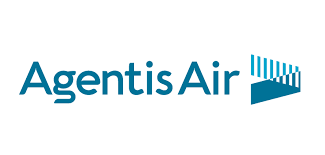All Charged Up: Agentis Air Aims To Improve Office Air Quality By Zapping Indoor Pollutants

In the wake of the pandemic, nearly 72% of workers across the globe are concerned about the air quality in their office buildings. Although the vast majority of workers said that they desired to receive updates about their offices’ air quality to ease their fears, only 13% were updated regularly.
According to the Environmental Protection Agency, poor indoor air quality can cause slowed productivity and more frequent employee absences. However, since the EPA has no standardized regulations for indoor air quality, employers may be finding it difficult to implement a solution that addresses the worries of their employees.
To ease these concerns, Agentis Air is working to create healthier indoor air with its Brio Portable Air Purifier, which goes beyond the limitations of traditional filtration materials.
“Brio has better technology than alternative options like HEPA air purifiers because it doesn’t clog,” said Larry Rothenberg, president of Agentis Air. “With a HEPA filter, or any other mechanical filter, performance starts to deteriorate as soon as you turn it on. As it collects particles, it starts restricting air flow. With Brio, there’s no such restriction.”
Agentis Air’s researchers, engineers and air quality experts provide office and residential spaces with clean air solutions. Based in Rockville, Maryland, the firm has formulated a more effective way of improving indoor air quality through state-of-the-art air purification technology.
The Brio Portable Air Purifier uses Agentis Air's patented Advanced Particle Removal Technology, or APART, to remove invisible, ultrafine particles that wreak havoc on human health. Ultrafine particles from smog, copier toner, mold and viruses are common indoor pollutants that permeate through office environments. Brio traps these particles and kills harmful viruses, all while providing constant, clean air flow.
Rothenberg said that contrary to popular belief, HVAC systems are not designed to control indoor air quality, but rather to keep particles from depositing on the system’s fan, blower and coils. In fact, many office buildings don't even have a sophisticated HVAC system, leaving the need to fill the gap left between what HVAC systems offer and truly healthy air.
“HVAC systems are not designed to maintain a healthy environment,” he said. “Ironically, the more energy-efficient the building is, the less work the HVAC system is doing. The role of a portable air purifier is to provide protection where employees are particularly vulnerable, a large number of employees congregate or in unusually high particulate exposure environments.”
Rothenberg said that HVAC systems and air purifiers are designed to work in tandem to create healthier living and working spaces. Considering that the majority of Americans spend 90% of their time indoors, having an air purifier that maximizes efficiency without breaking the bank is of utmost importance.
“APART technology works by charging particles as they go past Brio’s internal ionizing wires,” he said. “The charged particles are then trapped for disposal in a removable cartridge. This allows the air to flow into a room without clogging or performance impediments.”
HEPA technology requires a filter changeout at least every three months, Rothenberg said. This can be a costly and time-consuming process. With Brio, it is only necessary to change its cartridge once a year, cutting costs and maintenance efforts.
Now that more employees and employers are aware of air quality in the office, it is a smart move to make sure that people aren't transmitting pathogens to each other, he said. Whether it is Covid, the flu or any other pathogen that poses a threat presently or in the future, establishing a set of protocols to make sure that employees are safe and healthy is a wise business decision.
“Easing employee’s indoor air quality fears in a post-pandemic world is all about implementation and communication,” he said. “Products like indoor air quality monitors, air purifiers and hand washing stations were virtually unheard of three years ago in a commercial office setting, but they're becoming much more commonplace now. At the end of the day, employees want to be reassured that their employer cares about their health and well-being.”
For more information, Agentis Air has published a Guide to Better Indoor Air to help companies meet employees' expectations at work.
This article was produced in collaboration between Agentis Air and Studio B. Bisnow news staff was not involved in the production of this content.
Studio B is Bisnow’s in-house content and design studio. To learn more about how Studio B can help your team, reach out to studio@bisnow.com.

